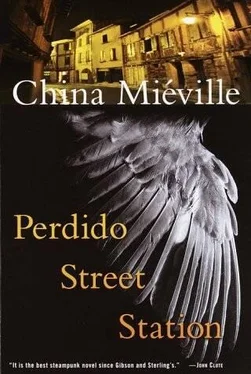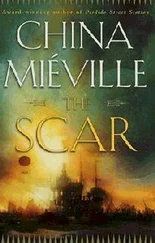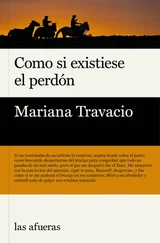China Mieville - Perdido Street Station
Здесь есть возможность читать онлайн «China Mieville - Perdido Street Station» весь текст электронной книги совершенно бесплатно (целиком полную версию без сокращений). В некоторых случаях можно слушать аудио, скачать через торрент в формате fb2 и присутствует краткое содержание. Жанр: Фантастика и фэнтези, на английском языке. Описание произведения, (предисловие) а так же отзывы посетителей доступны на портале библиотеки ЛибКат.
- Название:Perdido Street Station
- Автор:
- Жанр:
- Год:неизвестен
- ISBN:нет данных
- Рейтинг книги:4 / 5. Голосов: 1
-
Избранное:Добавить в избранное
- Отзывы:
-
Ваша оценка:
Perdido Street Station: краткое содержание, описание и аннотация
Предлагаем к чтению аннотацию, описание, краткое содержание или предисловие (зависит от того, что написал сам автор книги «Perdido Street Station»). Если вы не нашли необходимую информацию о книге — напишите в комментариях, мы постараемся отыскать её.
When Mae West said, "Too much of a good thing can be wonderful," she could have been talking about China Miéville's Perdido Street Station. The novel's publication met with a burst of extravagant praise from Big Name Authors and was almost instantly a multiaward finalist. You expect hyperbole in blurbs; and sometimes unworthy books win awards, so nominations don't necessarily mean much. But Perdido Street Station deserves the acclaim. It's ambitious and brilliant and-rarity of rarities-sui generis. Its clearest influences are Mervyn Peake's Gormenghast trilogy and M. John Harrison's Viriconium books, but it isn't much like them. It's Dickensian in scope, but fast-paced and modern. It's a love song for cities, and it packs a world into its strange, sprawling, steam-punky city of New Crobuzon. It can be read with equal validity as fantasy, science fiction, horror, or slipstream. It's got love, loss, crime, sex, riots, mad scientists, drugs, art, corruption, demons, dreams, obsession, magic, aliens, subversion, torture, dirigibles, romantic outlaws, artificial intelligence, and dangerous cults.
Generous, gaudy, grand, grotesque, gigantic, grim, grimy, and glorious, Perdito Street Station is a bloody fascinating book. It's also so massive that you may begin to feel you're getting too much of a good thing; just slow down and enjoy.
Yes, but what is Perdido Street Station about? To oversimplify: the eccentric scientist Isaac Dan der Grimnebulin is hired to restore the power of flight to a cruelly de-winged birdman. Isaac's secret lover is Lin, an artist of the khepri, a humano-insectoid race; theirs is a forbidden relationship. Lin is hired (rather against her will) by a mysterious crime boss to capture his horrifying likeness in the unique khepri art form. Isaac's quest for flying things to study leads to verification of his controversial unified theory of the strange sciences of his world. It also brings him an odd, unknown grub stolen from a secret government experiment so perilous it is sold to a ruthless drug lord-the same crime boss who hired Lin. The grub emerges from its cocoon, becomes an extraordinarily dangerous monster, and escapes Isaac's lab to ravage New Crobuzon, even as his discovery becomes known to a hidden, powerful, and sinister intelligence. Lin disappears and Isaac finds himself pursued by the monster, the drug lord, the government and armies of New Crobuzon, and other, more bizarre factions, not all confined to his world. -Cynthia Ward
From Publishers Weekly
King Rat (1999), Mi‚ville's much-praised first novel of urban fantasy/horror, was just a palate-teaser for this appetizing, if extravagant, stew of genre themes. Its setting, New Crobuzon, is an audaciously imagined milieu: a city with the dimensions of a world, home to a polyglot civilization of wildly varied species and overlapping and interpenetrating cultures. Seeking to prove his unified energy theory as it relates to organic and mechanical forms, rogue scientist Isaac Dan der Grimnebulin tries to restore the power of flight to Yagharek, a member of the garuda race cruelly shorn of its wings. Isaac's lover, Lin, unconsciously mimics his scientific pursuits when she takes on the seemingly impossible commission of sculpting a patron whose body is a riot of grotesquely mutated and spliced appendages. Their social life is one huge, postgraduate bull session with friends and associates-until a nightmare-inducing grub escapes from Isaac's lab and transforms into a flying monster that imperils the city. This accident precipitates a political crisis, initiates an action-packed manhunt for Isaac and introduces hordes of vividly imagined beings who inhabit the twilight zone between science and sorcery. Mi‚ville's canvas is so breathtakingly broad that the details of individual subplots and characters sometime lose their definition. But it is also generous enough to accommodate large dollops of aesthetics, scientific discussion and quest fantasy in an impressive and ultimately pleasing epic.













